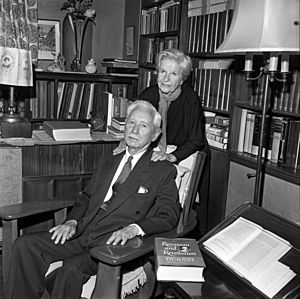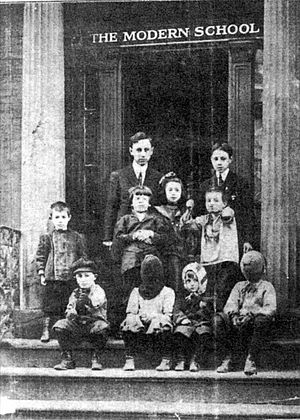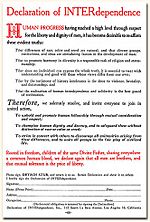Will Durant facts for kids
Quick facts for kids
William Durant
|
|
|---|---|

William and Ariel Durant (1967)
|
|
| Born | William James Durant November 5, 1885 North Adams, Massachusetts, U.S. |
| Died | November 7, 1981 (aged 96) Los Angeles, California |
| Occupation |
|
| Nationality | American |
| Education | Saint Peter's College (BA, 1907) Columbia University (PhD, 1917) |
| Genre | non-fiction |
| Subject | History, philosophy, religion |
| Literary movement | Philosophy, etc. |
| Spouse | |
William James Durant (born November 5, 1885 – died November 7, 1981) was an American writer, historian, and philosopher. He is best known for his huge work, The Story of Civilization. This series has 11 books and tells the history of both Eastern and Western civilizations.
He wrote The Story of Civilization with his wife, Ariel Durant. They published the books between 1935 and 1975. Before that, he was famous for The Story of Philosophy (1926). This book helped make philosophy popular for many people.
Durant believed that philosophy was about seeing things from a "whole perspective." He wanted to bring together and make human history easier to understand. History had become very detailed and split into many different topics. Because of their success, William and Ariel Durant won the Pulitzer Prize for General Nonfiction in 1968. They also received the Presidential Medal of Freedom in 1977.
Contents
Early Life and Education
William James Durant was born in North Adams, Massachusetts. His parents, Joseph Durant and Mary Allard, were French-Canadian Catholics. They had moved to the United States from Quebec.
After finishing high school at St. Peter's Preparatory School in 1903, Durant went to Saint Peter's College in Jersey City. He thought about becoming a priest, which was his mother's wish.
Around 1905, he became interested in socialist ideas. However, after World War I, he started to see that a "desire for power" was behind all political actions. He focused more on philosophy, especially the ideas of Baruch Spinoza. Durant graduated from Saint Peter's College in 1907.
Teaching Career
From 1907 to 1911, Durant taught Latin and French at Seton Hall University in New Jersey.
After leaving Seton Hall, Durant taught at the Ferrer Modern School from 1911 to 1913. This school was an experiment in a different kind of education. A supporter of the school, Alden Freeman, helped Durant travel around Europe. At the Modern School, Durant met and married a 15-year-old student named Chaya Kaufman. He later called her "Ariel." The Durants had one daughter, Ethel, and also raised Ariel's nephew, Louis.
In 1913, Durant left his teaching job. To earn money, he started giving lectures in a church. These lectures became the first ideas for his famous series, The Story of Civilization.
From 1914 to 1927, Durant was a director and lecturer at the Labor Temple School in New York City. During this time, he also studied at Columbia University. He earned his PhD in philosophy in 1917.
Writing Career
In 1908, Durant worked as a reporter for the New York Evening Journal.
In 1917, while studying for his doctorate at Columbia University, he wrote his first book. It was called Philosophy and the Social Problem. In this book, he argued that philosophy needed to deal with real-world problems to grow. He received his doctorate that same year.
The Story of Philosophy
The Story of Philosophy started as a series of small educational booklets. They were very popular, so they were published as a full book in 1926. It became a bestseller! This success gave the Durants enough money to travel the world. It also allowed them to spend 40 years writing The Story of Civilization. Will stopped teaching to work on this huge 11-volume project.
The Story of Civilization
Image:The collection of 11 volumes of the Story of Civilization by Will and Ariel Durant.jpg
When writing The Story of Civilization, the Durants wanted to create what they called "integral history." This meant they wanted to tell the whole story of a civilization. They didn't just write about wars, politics, or famous people. They also included the history of culture, art, philosophy, religion, and how people lived every day. Their goal was to write a "biography" of Western civilization over 2500 years.
The Story of Civilization is the most successful history series ever written. For Rousseau and Revolution (1967), which was the 10th book in the series, the Durants won the Pulitzer Prize for literature. In 1977, they received the Presidential Medal of Freedom. This is one of the highest awards given to civilians in the United States.
The first book in the series, Our Oriental Heritage (1935), explores different parts of civilization. It covers the civilizations of the Near East (like Sumer, Egypt, and Babylonia). It also looks at India and its neighbors, and the Chinese Civilization and Japan.
Other Important Works
In 1944, Durant suggested starting a movement against racial intolerance. This led to the "Declaration of Interdependence." The movement began in 1945. The Declaration was even read into the Congressional Record, which is a record of what happens in the U.S. Congress.
Durant also gave many speeches. One famous speech was "Persia in the History of Civilization" in Tehran, Iran, in 1948.
After Rousseau and Revolution, the Durants published a smaller book called The Lessons of History. This book was a summary of their big history series. It also looked at what we can learn from human history.
Ariel and Will had planned to continue The Story of Civilization into the 20th century. However, because they were very old, they thought the 10th book would be their last. But they went on to publish an 11th book, The Age of Napoleon, in 1975. They also left notes for a 12th book, The Age of Darwin, and an outline for a 13th book, The Age of Einstein. These would have taken their story up to 1945.
Some of Durant's works have been published after his death. These include The Greatest Minds and Ideas of All Time (2002) and Heroes of History (2001).
Final Years
William and Ariel Durant had a very strong love for each other. They wrote about it in their book A Dual Autobiography. When Will went to the hospital, Ariel stopped eating. She died on October 25, 1981. Even though their family tried to keep the news from Will, he found out about Ariel's death from the evening news. He died two weeks later, on November 7, 1981, just after his 96th birthday. Will was buried next to Ariel in Los Angeles.
Writing about Russia
In 1933, Durant published Tragedy of Russia: Impressions from a Brief Visit. Soon after, he wrote The Lesson of Russia. The famous social commentator Will Rogers praised Durant's writing on Russia. He called Durant "our best writer on Russia" and said he was "the most fearless writer that has been there."
Writing about India
In 1930, Durant visited British India to gather information for The Story of Civilization. While there, he was shocked by the extreme poverty and starvation he saw. He took a break from his main project to write a short book called The Case for India. In this book, he wrote about how Britain was "consciously and deliberately bleeding India." He described the British takeover as the "invasion and destruction of a high civilization" by a trading company that cared only about money.
Selected Books
- 1917: Philosophy and the Social Problem
- 1926: The Story of Philosophy
- 1930: The Case for India
- 1968: (with Ariel Durant) The Lessons of History
- 1977: (with Ariel Durant) A Dual Autobiography
- 2001: Heroes of History: A Brief History of Civilization from Ancient Times to the Dawn of the Modern Age
- 2002: The Greatest Minds and Ideas of All Time
- 2014: Fallen Leaves
The Story of Civilization Series
- 1935: Our Oriental Heritage
- 1939: The Life of Greece
- 1944: Caesar and Christ
- 1950: The Age of Faith
- 1953: The Renaissance
- 1957: The Reformation
- 1961: (with Ariel Durant) The Age of Reason Begins
- 1963: (with Ariel Durant) The Age of Louis XIV
- 1965: (with Ariel Durant) The Age of Voltaire
- 1967: (with Ariel Durant) Rousseau and Revolution
- 1975: (with Ariel Durant) The Age of Napoleon
See also
 In Spanish: Will Durant para niños
In Spanish: Will Durant para niños
 | Sharif Bey |
 | Hale Woodruff |
 | Richmond Barthé |
 | Purvis Young |



